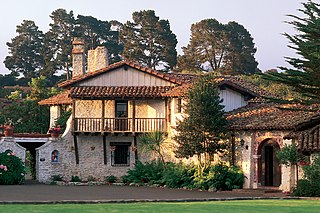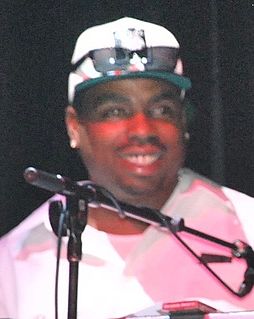
John Ernst Steinbeck Jr. was an American author and the 1962 Nobel Prize in Literature winner "for his realistic and imaginative writings, combining as they do sympathetic humour and keen social perception." He has been called "a giant of American letters," and many of his works are considered classics of Western literature.

Monterey is a city located in Monterey County on the southern edge of Monterey Bay on the U.S. state of California's Central Coast. Founded on June 3, 1770, it functioned as the capital of Alta California under both Spain and Mexico. During this period, Monterey hosted California's first theater, public building, public library, publicly-funded school, printing-press, and newspaper. It was originally the only port of entry for all taxable goods in California. In 1846, during the Mexican–American War of 1846–1848, the United States flag was raised over the Customs House. After Mexico ceded California to the U.S. at the end of the war, Monterey hosted California's first constitutional convention in 1849.

Mary-Kate Olsen and Ashley Fuller Olsen, also known as the Olsen twins as a duo, are American fashion designers and former actresses. The twins made their acting debut as infants playing Michelle Tanner on the television series Full House. At the age of six, Mary-Kate and Ashley began starring together in TV, film, and video projects, which continued to their teenage years. Through their company Dualstar, the Olsens joined the ranks of the wealthiest women in the entertainment industry at a young age.

Cannery Row is the waterfront street bordering the city of Pacific Grove, but officially in the New Monterey section of Monterey, California. It was the site of a number of now-defunct sardine canning factories. The last cannery closed in 1973. The street name, formerly a nickname for Ocean View Avenue, became official in January 1958 to honor John Steinbeck and his well-known novel Cannery Row. In the novel's opening sentence, Steinbeck described the street as "a poem, a stink, a grating noise, a quality of light, a tone, a habit, a nostalgia, a dream."

The twelve-tone technique—also known as dodecaphony, twelve-tone serialism, and twelve-note composition—is a method of musical composition first devised by Austrian composer Josef Matthias Hauer, who published his "law of the twelve tones" in 1919. In 1923, Arnold Schoenberg (1874–1951) developed his own, better-known version of 12-tone technique, which became associated with the "Second Viennese School" composers, who were the primary users of the technique in the first decades of its existence. The technique is a means of ensuring that all 12 notes of the chromatic scale are sounded as often as one another in a piece of music while preventing the emphasis of any one note through the use of tone rows, orderings of the 12 pitch classes. All 12 notes are thus given more or less equal importance, and the music avoids being in a key. Over time, the technique increased greatly in popularity and eventually became widely influential on 20th-century composers. Many important composers who had originally not subscribed to or actively opposed the technique, such as Aaron Copland and Igor Stravinsky, eventually adopted it in their music.

Marion Hugh "Suge" Knight Jr. is an American former music executive and the co-founder and CEO of Death Row Records, who was a central figure in gangsta rap's catapult to massive commercialization. This feat is attributed to the record label's first two album releases: Dr. Dre's The Chronic in 1992 and Snoop Dogg's Doggystyle in 1993.

Death Row Records was an American record label founded in 1992 by Dr. Dre, Suge Knight, The D.O.C. and Dick Griffey. The label became a sensation by releasing multi-platinum hip-hop albums by West Coast-based artists such as Dr. Dre, Snoop Dogg (Doggystyle), Tha Dogg Pound, and Tupac Shakur during the 1990s. At its peak, Death Row was making over US$100 million a year.

Delmar Drew Arnaud, of the stage name Daz Dillinger, formerly Dat Nigga Daz, and commonly Daz, is an American rapper, songwriter and record producer who, in the 1990s at Death Row Records, aided the catapult of West Coast rap and gangsta rap into the mainstream. He is one half of the rap duo tha Dogg Pound, along with Kurupt.

Capital punishment, also called the death penalty, is a legal penalty in the United States, with it being a legal punishment in 27 states, American Samoa, the federal government, and the military. Although it is a legal penalty in 27 states, only 21 states have the ability to execute death sentences, with the other 6 being subject to different types of moratoria. The Virginia General Assembly has enacted an Act that abolishes the death penalty in that state beginning July 1, 2021, and no executions have been scheduled between the present and that date, effectively abolishing capital punishment immediately. The existence of capital punishment in the United States can be traced to the beginning of the American colonies. Along with Japan, Taiwan, and Singapore, the United States is one of four advanced democracies and the only Western nation that applies the death penalty regularly. It is one of 48 countries worldwide applying it, and was the first to develop lethal injection as a method of execution, which has since been adopted by five other countries. The Philippines has since abolished executions, and Guatemala has done so for civil offenses, leaving the United States as one of four countries to still use this method. In Singapore and Japan, executions are carried out by long drop hanging. In Taiwan, the preferred method of execution has long been by fatal gunshot; though never used, lethal injection was considered by authorities in the past and remains an option on the books. It is common practice worldwide for the condemned to be administered sedatives prior to execution, regardless of the method used.

Capital punishment is a legal penalty in the U.S. state of California. As of March 2019, further executions are halted by an official moratorium ordered by Governor Gavin Newsom. Prior to the moratorium, executions were frozen by a federal court order since 2006, and the litigation resulting in the court order has been on hold since the enactment of the moratorium. As such, there will be a court ordered moratorium on executions after the termination of Newsom's moratorium if the death penalty exists in California by then.

San Quentin State Prison (SQ) is a California Department of Corrections and Rehabilitation state prison for men, located north of San Francisco in the unincorporated place of San Quentin in Marin County.

Stanford Stadium is an outdoor athletic stadium in Stanford, California, on the campus of Stanford University. It is the home of the Stanford Cardinal college football team as well as the site of the university's commencement exercises. It opened in 1921 as a football and track and field stadium, an earthen horseshoe with wooden bleacher seating and flooring upon a steel frame. Its original seating capacity was 60,000, which grew to 89,000 by 1927 as a nearly enclosed bowl. Immediately following the 2005 season, the stadium was demolished and rebuilt as a dual-deck concrete structure, without a track. Today, it seats 50,424.

Santana Row is a residential and commercial district of West San Jose in San Jose, California, in Silicon Valley. Santana Row is intersected by Stevens Creek Boulevard, a major Silicon Valley thoroughfare, and nearby to local landmarks like Westfield Valley Fair and the Winchester Mystery House.

California-Kirkbride is a neighborhood on Pittsburgh, Pennsylvania's North Side.

Cannery Row is a novel by American author John Steinbeck, published in 1945. It is set during the Great Depression in Monterey, California, on a street lined with sardine canneries that is known as Cannery Row. The story revolves around the people living there: Lee Chong, the local grocer; Doc, a marine biologist; and Mack, the leader of a group of derelict people.

Skid Row is a neighborhood in Downtown Los Angeles. The area is also known as Central City East.
Death row, also known as condemned row, is a place in a prison that houses inmates awaiting execution after being convicted of a capital crime. The term is also used figuratively to describe the state of awaiting execution, even in places where no special facility or separate unit for condemned inmates exists. In the United States, after a person is found guilty of a capital offense in death penalty states, the judge will give the jury the option of imposing a death sentence or life imprisonment without the possibility of parole. It is then up to a jury to decide whether to give the death sentence; this usually has to be a unanimous decision. If the jury agrees on death, the defendant will remain on death row during appeal and habeas corpus procedures, which may continue for several years.

The shooting of Charley Leundeu Keunang, a 43-year-old Cameroonian national, occurred in Los Angeles, California, on March 1, 2015. He was shot by three Los Angeles Police Department officers.


















